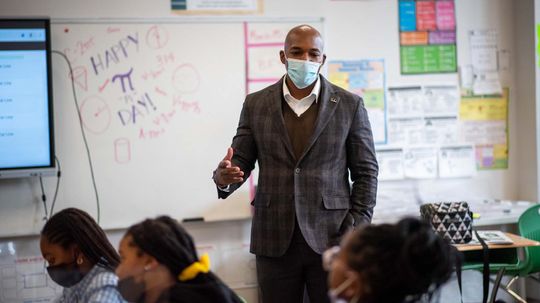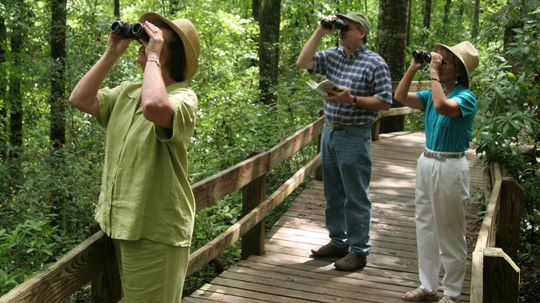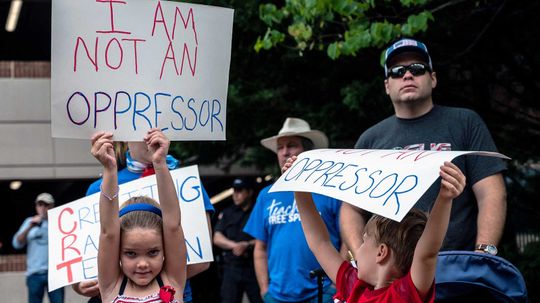Education
Education includes information on learning and career training. Learn more about topics like homeschooling, college-prep, career paths and more.

6 Military-friendly Colleges (Including Online Programs)

The Hardest Medical Schools to Get Into Accept

What’s the Hardest College To Get Into in the World?

Objective vs. Subjective Thinking and Applications

10 Hyperbole Examples That Make Mountains out of Molehills

Personification Examples to Make Your Writing More Interesting
Learn More
For service members and veterans, navigating college can feel like entering a different world. Fortunately, military-friendly colleges are designed to support military students with flexible programs, tuition assistance, and dedicated resources.
Getting into med school is already a steep climb. But the hardest medical schools to get into? That's a whole different mountain.
Getting into college is tough, but getting into one of the most selective universities on Earth? Not even a perfect GPA guarantees you an admissions letter.
Advertisement
Some tests check if you did your homework. The hardest test in the world checks if you can rewrite the rules. These exams are brutal, long, and designed to filter only the most prepared minds.
Liberal colleges often stand out for their focus on diversity, social justice and inclusive education. These schools attract some of the most liberal students in the country and offer academic environments shaped by progressive values.
The states with the best public schools don't just have bragging rights. A strong public school system can shape a child's future and even boost property values.
Education levels vary widely across the U.S., and some states consistently fall behind in both school quality and degree attainment.
Advertisement
What do Oprah Winfrey, Spike Lee and Martin Luther King Jr. have in common? All of them graduated from HBCUs, or historically Black colleges and universities. These institutions play a major role in U.S. higher education, especially for Black Americans.
Some college majors demand late nights, complex equations and lab reports that never end. Others? Not so much.
Some college majors are years of all-nighters in disguise. The hardest college majors often demand a cocktail of grit, gray matter, and an unshakable love for complexity. Whether you're wrangling multivariable calculus or spending entire weekends on lab reports, these fields are not for the faint of heart.
Ivy League universities might conjure images of ivy-covered walls, tweed jackets, and old-money prestige. But there's more to these schools than tradition and architecture.
Advertisement
We're not talking about clickbait here. The youngest teacher in America is a real young woman named Shania Muhammad, and she became the youngest full-time teacher in the United States in 2024.
Some kids go from finger painting to finals faster than most people can say "graduation."
There are multiple ways to determine the most educated states in the U.S.: Is it the state with the highest percentage of high school diploma holders? The best public schools? The one with the most people who hold graduate degrees? Do you weigh all forms of graduate school education equally when curricula vary so much between MBA, MFA and PhD programs?
By Karina Ryan
To grasp objective vs. subjective thinking, it's crucial to understand what makes each type of reasoning unique. Subjective information is based on personal opinions or feelings regarding a particular subject matter. In contrast, objective information is factual, data-based and unbiased.
By Mack Hayden
Advertisement
We use subordinating conjunctions all the time, often without even knowing what they are. But how exactly do they work?
By Sascha Bos
Hyperbole is an ancient Greek word that roughly translates to "go beyond." The many hyperbole examples you find in everyday speech align with this idea of going further than the truth to drive a point home.
By Mitch Ryan
Like other forms of figurative language, personification can make your writing more dynamic. By giving human qualities to inanimate objects, you can uniquely describe situations that will resonate with your reader.
By Yara Simón
Remembering the parts of speech can be tricky. It may have been a while since you took a grammar class, so you might appreciate a helpful tool for remembering coordinating conjunctions. These helpful little words can be brought to mind using the FANBOYS acronym, which stands for: For, And, Nor, But, Or, Yet, So.
By Zach Taras
Advertisement
We use subordinating conjunctions all the time, often without even knowing what they are. But how exactly do they work?
By Sascha Bos
In the United States, there's Harvard University. In the U.K., there's Oxford University. Each is the oldest in its respective country, though neither has been around quite as long as the oldest university in the world.
By Sascha Bos
A pilot program in the Atlanta Public School system is teaching students de-escalation strategies during one of the city's worst crimewaves in decades. Will it work?
By Dave Roos
Here are four alternative venues where the general public can enjoy nature, engage in hands-on science learning and get a behind-the-scenes look at scientific research in action.
Advertisement
Science education methods are changing as a result of the Next Generation Science Standards, which aim to define a uniform vision for K-12 science education across the U.S.
Critical race theory (CRT) is a hot button issue in the United States. School boards and state legislatures in seven states have passed regulations banning it from being taught in the classroom. How did we get here and why is everyone freaking out?























